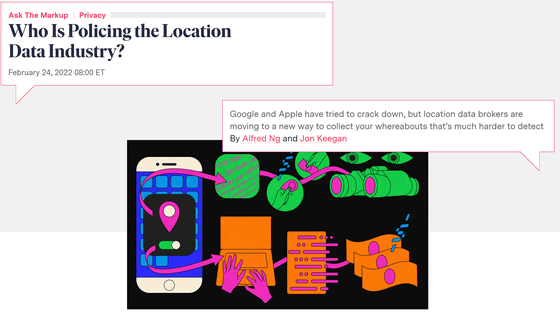How can we crack down on location brokers on smartphones that break through regulations?

While the location information of smartphones is very convenient for navigating to the destination and delivering personalized advertisements, I suddenly became worried that 'Isn't it always tracked and monitored?' There should be many people. In fact, the location data collected by the app is traded by brokers, and its market size is estimated to be $ 12 billion (about 1.3 trillion). Technology media The Markup summarizes why such market transactions are possible and how to regulate them.
Who Is Policing the Location Data Industry? – The Markup
https://themarkup.org/ask-the-markup/2022/02/24/who-is-policing-the-location-data-industry

There are no laws restricting the sale of location information in the United States, and buying and selling location information collected from mobile phones is a completely legal business. Unauthorized use of location information is being cracked down by Apple and Google, which provide apps, to clarify to users that they are acquiring location information and to regulate specific data brokers. I am.
As a concrete measure, Apple and Google are trying to regulate the sale of data by enacting policies and cracking down on software development kits (SDKs) designed to send the location information of users of apps to brokers. is. However, experts and location-based industry insiders say, 'This move is inadequate and there are many loopholes.'
Originally, location transactions were used by sending data directly from the SDK secretly included in the app's code to the data broker to sell and analyze location information. To regulate it, Apple and Google are cracking down on this mechanism by scanning the SDK that exists in the app. However, the broker is currently shifting to a new method, and if the application developer has a contract with the broker, it is possible to directly supply the user's location information data by 'transfer between servers'.
More than 1000 Android apps are stealing your personal information without permission, even if you do not allow it-GIGAZINE

by rawpixel.com
As an example of data sales that bypass regulations, The Markup reported in December 2021 that the child watching app Lfe360 had a contract to transfer location data about users directly to brokers. After the press, Life360 stopped selling location data, but by then tens of millions of people had been traded and brokers said, 'Without Life360 data, we couldn't run a marketing campaign.' It was one of the largest data sources in the industry.
It was discovered that 'Life360', which acquired the lost item tracker 'Tile', was selling the location data of tens of millions of users without permission --GIGAZINE

Both Apple and Google have set policies for location acquisition and sales, but since data brokers are starting to acquire location information in untraceable ways, 'How can we enforce the policy? Also, neither can answer how the app uses the user's location, 'The Markup points out.
'Apple and Google let users know what's happening in their data,' said Surge Egerman, a researcher at the University of California, Berkeley 's Institute for International Computer Science, as a way to crack down on location trafficking. However, the real crackdown on data sales must be done through government intervention. '

The app store can only detect the existence of the SDK and whether the data is sent to a third party server when the app is executed, and it can not be solved by technology any more. Apple and Google can ask you to disclose where your user data is sold to your app in the store, but there's no way to tell if the app provider lied.
While there are no data privacy laws in the United States, some states, such as California, have their own regulations. However, the California privacy law does not allow data brokers to be identified and regulated, so Justin Sherman, a member of the Institute of Technology Policy at Duke University, said, 'The individual action on the spot is final. However, it is more effective to approach systematic regulation as a policy to deal with this problem of unjustified buying and selling of location information. '
Related Posts:
in Mobile, Posted by log1e_dh




